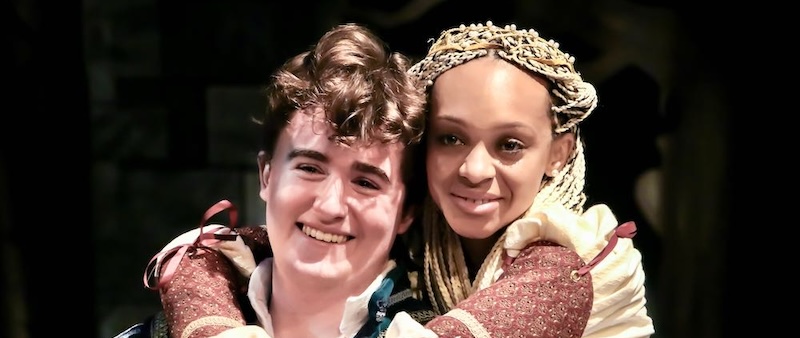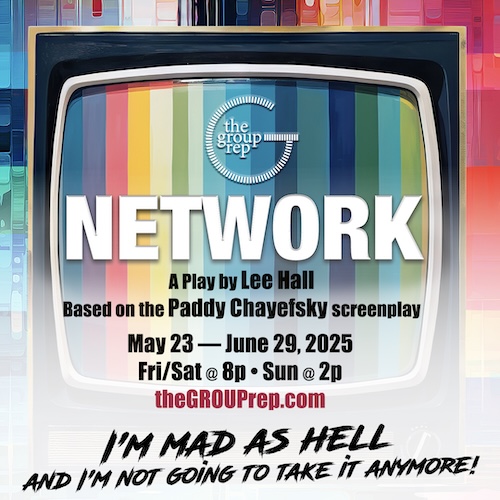
Robbie Macey and Miko Monroe (Michael Hardy Photography)
Reviewed by Joel Beers
Long Beach Playhouse
Through November 30
RECOMMENDED
With countless stage productions, cinematic and literary adaptations, scholarly dissections, pop culture riffs, and endless derivations — hell, even the spin-offs have spin-offs (West Bank Story, anyone?) — plus its canonization as the archetypal portrayal of forbidden love — is there anything new left to say about Shakespeare’s Romeo and Juliet?
Well, yes, there is.
It’s a cautionary tale about the existential threat of thermonuclear war. OK, maybe a bit hyperbolic, but next to Reed Richards warding off the galaxy-devouring Galactus with the ultimate nullifier, no weapon has ever matched the destructive power of the one found in R&J —the dagger. Or maybe it’s a dirk, stiletto, shiv, or bodkin. Whatever its name, it’s as lethal as most three-hour uncut versions of the play.
Not that this Long Beach Playhouse production falls into that category, but as far as its potency, the dagger cuts to the heart of the tragedy — both literally and metaphorically. Even though swordplay is rampant — and choreographed remarkably well — all but one of the bodies that drop during this play come from being stabbed by the short blade, whether by accident or design.
In fact, judging by this production, the very sight of a dagger should be enough to induce panic in any reasonable person, because it seems magnetically attracted to any number of vital organs. Or perhaps Shakespeare thought Italians were born with an instinctive knowledge of how to use it — even a 13-year-old need not guess how to impale herself when the time comes.
This isn’t meant to deride this Lauren Velasco-directed production. Yes, it seems a bit strange that the power and length of a sword is as vexing as a fly, while a weapon that requires far more skill is tantamount to nitroglycerin. But there’s a lot of strange to R&J: lovers who marry in a day, families feuding over nothing, Friar Laurence’s zeal to break secular law, Tybalt’s hard-on for hating Montagues, a fate so unforgiving it makes every choice feel like a trap.
The only logical way to approach such a thicket of weird is to play it straight — without trying to justify anything for modern audiences. And this is, pretty much, a by-the-book Romeo and Juliet Little seems to be cut, the actors are well connected to the rhythms and substance of Shakespeare’s words, the stage combat and brief dance in the banquet scene are faithfully enacted, and the overall impression is that this production takes the play seriously enough to do it as written — even if the dagger keeps showing up.
But that doesn’t mean it’s a slave to the text — or how that text is usually approached by purists. Non-traditional casting, both in terms of ethnicity and sexuality, is the prominent example. Whether Velasco did it by design or cast solely on the basis of actor suitability, it works splendidly — mostly because it’s so seamless and unobtrusive.
And at least in one major role, it yields gold: the casting of Colleen McCandless as Mercutio. Mercutio is always the life of the R&J party; a key dynamic in the social circle of (usually) young men that carouse around Verona, and the most quick-witted, sharp-tongued and rebellious of the bunch. But despite the fact that even female Muggles have played the role (Fiona Shaw, Harry Potter’s aunt and not a half-bad Irish actress, for one) Mercutio embodies many traits that are traditionally associated with masculinity: competitiveness, a strong sense of honor, impulsiveness, and bravado.
McCandless nails all of that but also imbues her Mercutio with qualities that, without sounding too much like someone hopelessly tied to the ossified social construct of gender roles, feel more feminine — mystery, vulnerability, and “hell hath no fury like…” Her speech about Queen Mab takes on an ethereal, almost clairvoyant quality (boosted by a silhouette visual on the back wall), almost suggesting that she is foretelling Romeo’s being caught in an inescapable web leading to his downfall.
When she spits out “A plague o’ both your houses” four times, there is an indignant fury in her voice, lending some credence to those who think Romeo and Juliet aren’t truly star-crossed until Mercutio curses them. But there’s also a fluidity and teasing aspect to her physical and vocal performance. This doesn’t subvert or challenge gender norms as much as render them insignificant. Whether through conscious choice or sheer acting talent is irrelevant; it’s still a marvel to experience.
The only problem is that damn dagger takes Mercutio out at the end of Act 1, silencing this production’s most compelling voice.
That isn’t to say the rest of the cast falters. The ensemble is remarkably connected to Shakespeare’s verse, and among the standouts are Patty van Empel’s Nurse, Scott Haven’s Lord Capulet, and Jack Loeprich’s Tybalt.
But while Mercutio often steals the show, and McCandless absolutely dominates in this role, the fate of every R&J production ultimately falls to the portrayal of the titular characters. Miko Monroe’s Juliet is up to the challenge. Her portrayal is feisty and naïve — a 13-year-old who is wise beyond her years but still just 13, in a time before digital puberty made girls the masters of the consumer universe.
Alas, Robbie Macey’s Romeo is not. Due to the ubiquitousness of the Romeo archetype, it’s easy to lose sight of the fact that he is perhaps the quintessential romantic figure in Western literary history. He’s certainly the most poetic, his language expressed in flowing, lyrical verse, that conveys the intensity and ardor of his love through vivid imagery, metaphors, and passionate expression.
But to feel that, he has to be understood — and Macey is too often not. To his credit, he is absolutely committed to the character’s extreme highs and lows, but fully committing to a choice is one thing; fully committing to the same choice over and over is another. Macey seems to have two levels: over-emoting and really over-emoting. It makes his vocal quality strained, if not irritating, and whereas Juliet has as many levels as the Spanish Steps, Macey’s Romeo seems trapped in the foundering boat depicted in the Barcaccia Fountain. (I know, wrong city, but I’m working on something here.)
That makes the Mercutio-absent second act feel close to the approximately 70 minutes that it is, unlike the first act, which feels quicker than its approximately 80 minutes.
But this remains a laudable production of R&J, one elevated by more than a phenomenal performance by McCandless. Embodied by Haven’s Capulet, it also underscores the oppressive patriarchy that helps propel the oppressed Juliet to her fantasies of romantic flight and her eventual doom — at least in those realms she can at last make her own choices. But even the unfortunate reminder that toxic masculinity in the shape of petty tyrants still exists runs a distant second to what is, obviously, the real significance of R&J to modern audiences:
For the love of God, let’s get rid of the daggers!!
Long Beach Playhouse, 5021 E. Anaheim St., Long Beach; Fri.-Sat., 8 pm, Sun., 2 pm; thru Nov. 30. https://lbplayhouse.org











